Charles E W Bean, Diaries, AWM38 3DRL 606/245/1 - 1915 - 1925 - Part 7
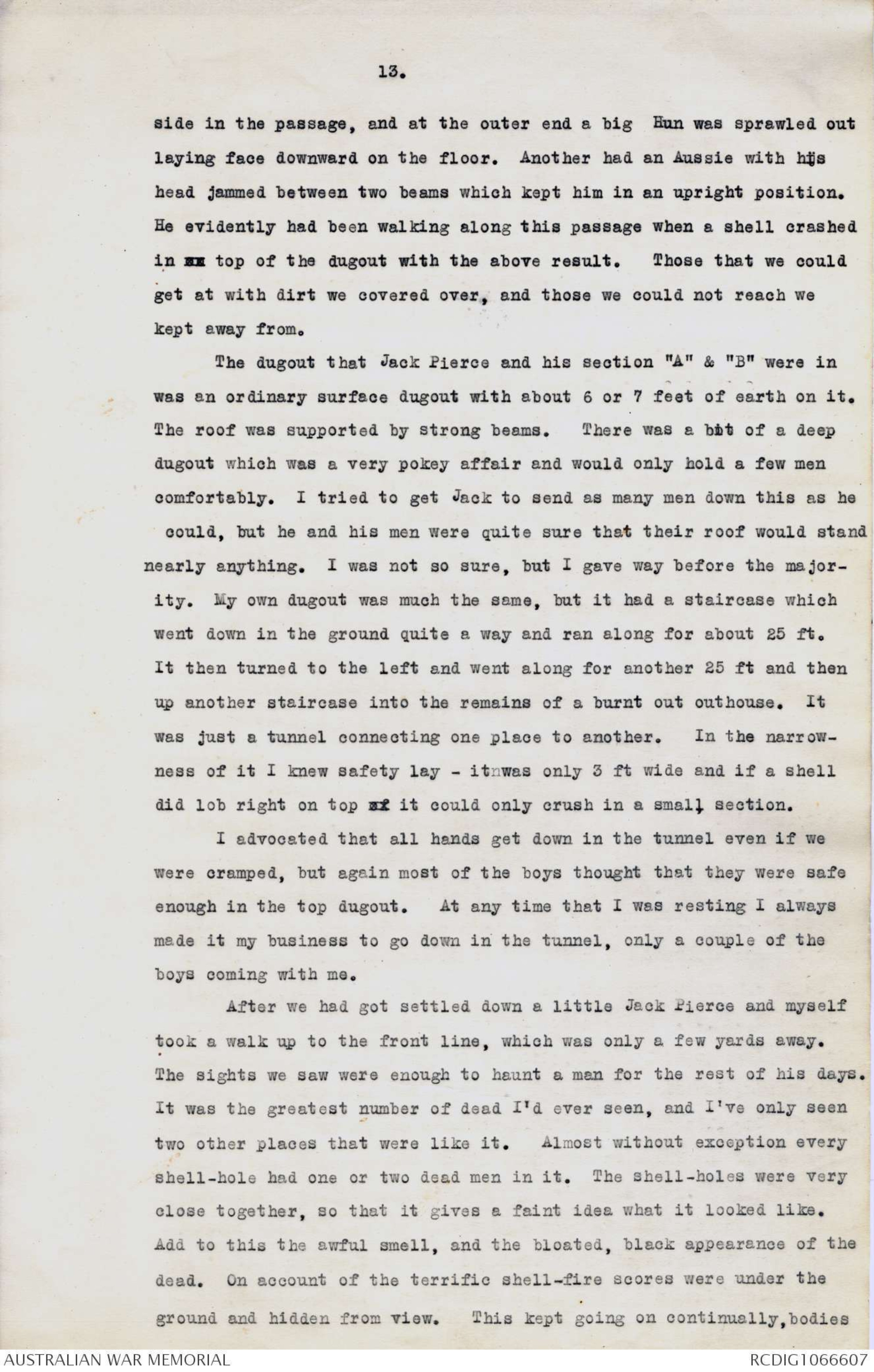
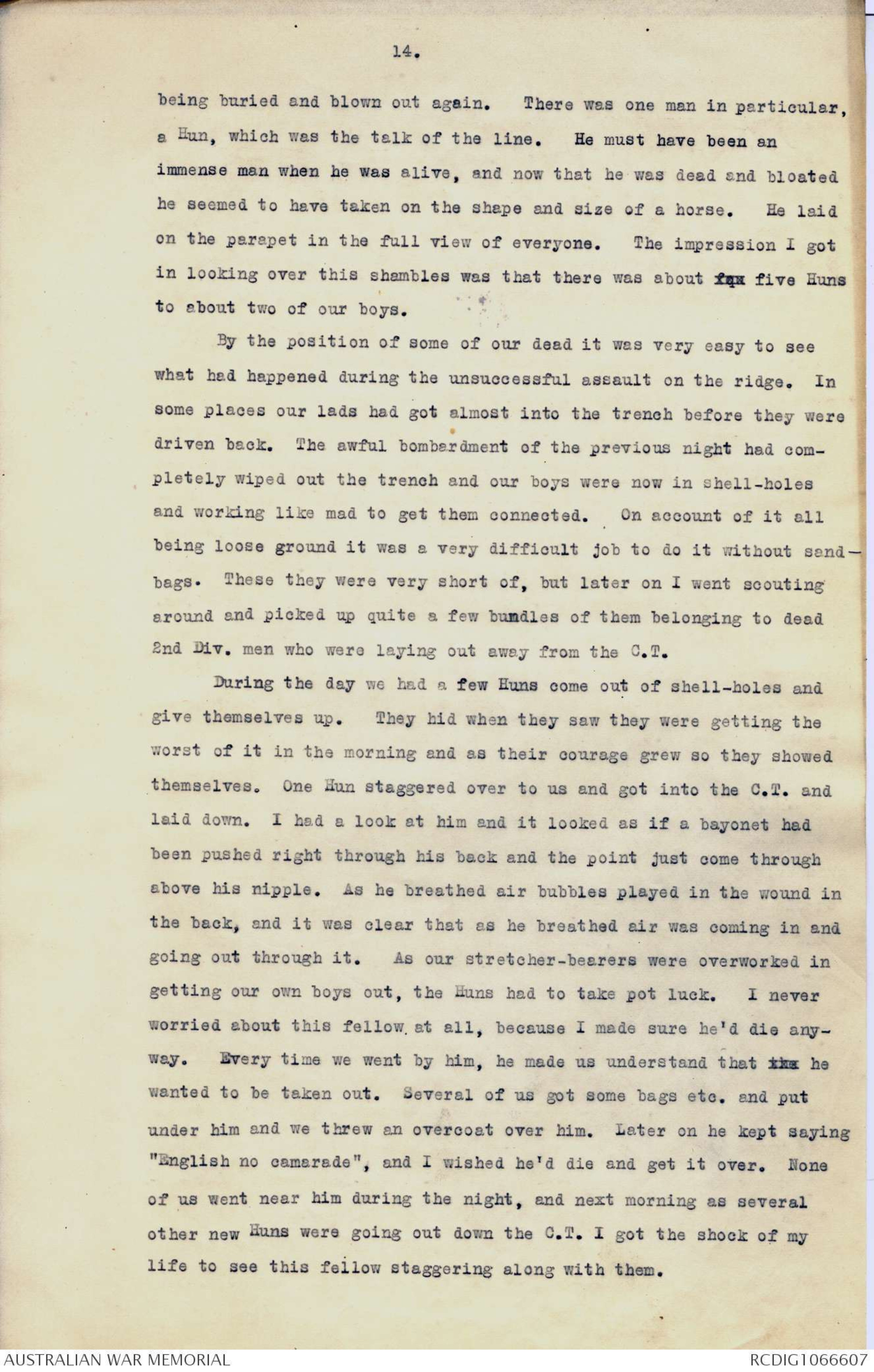
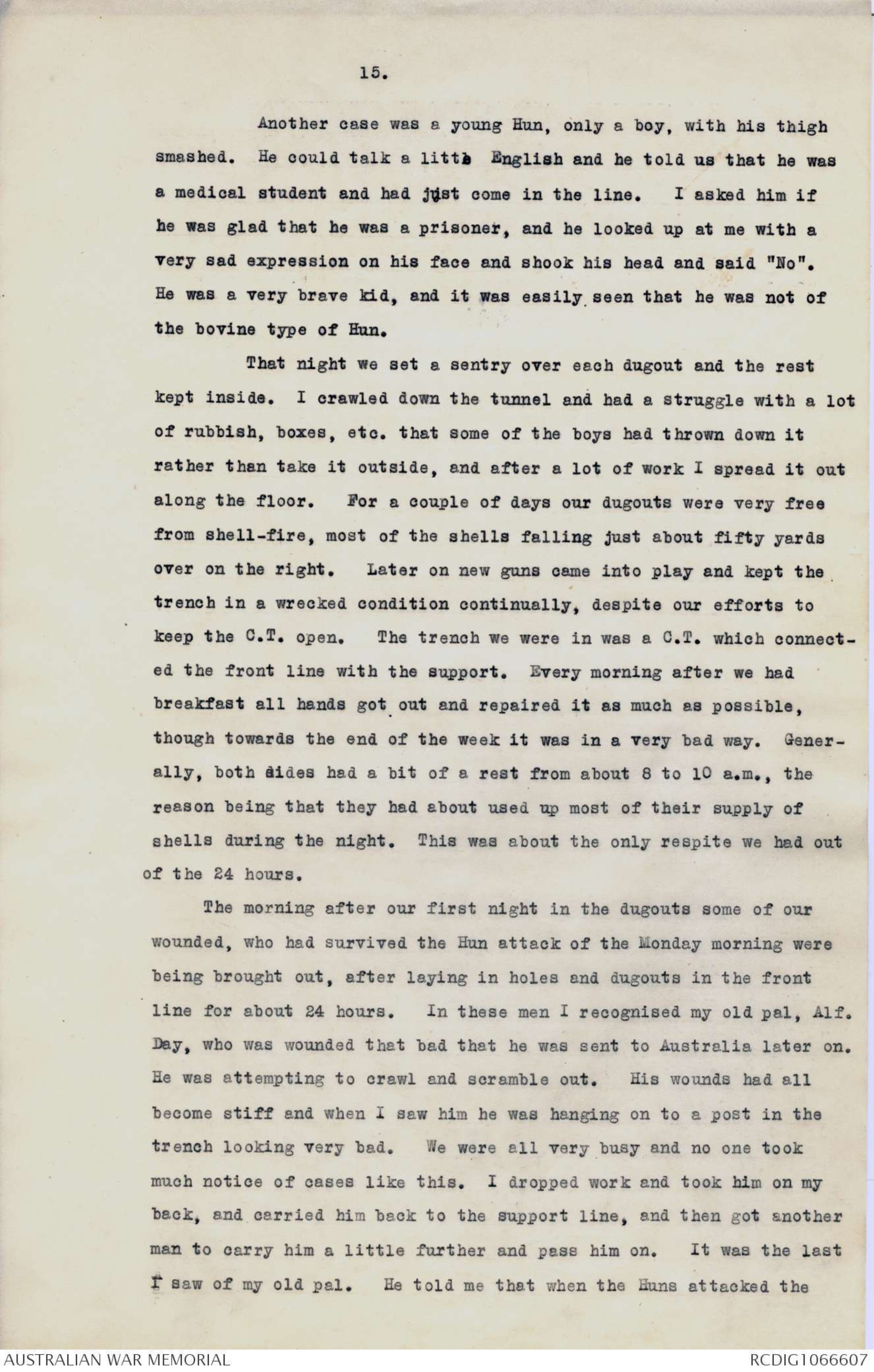
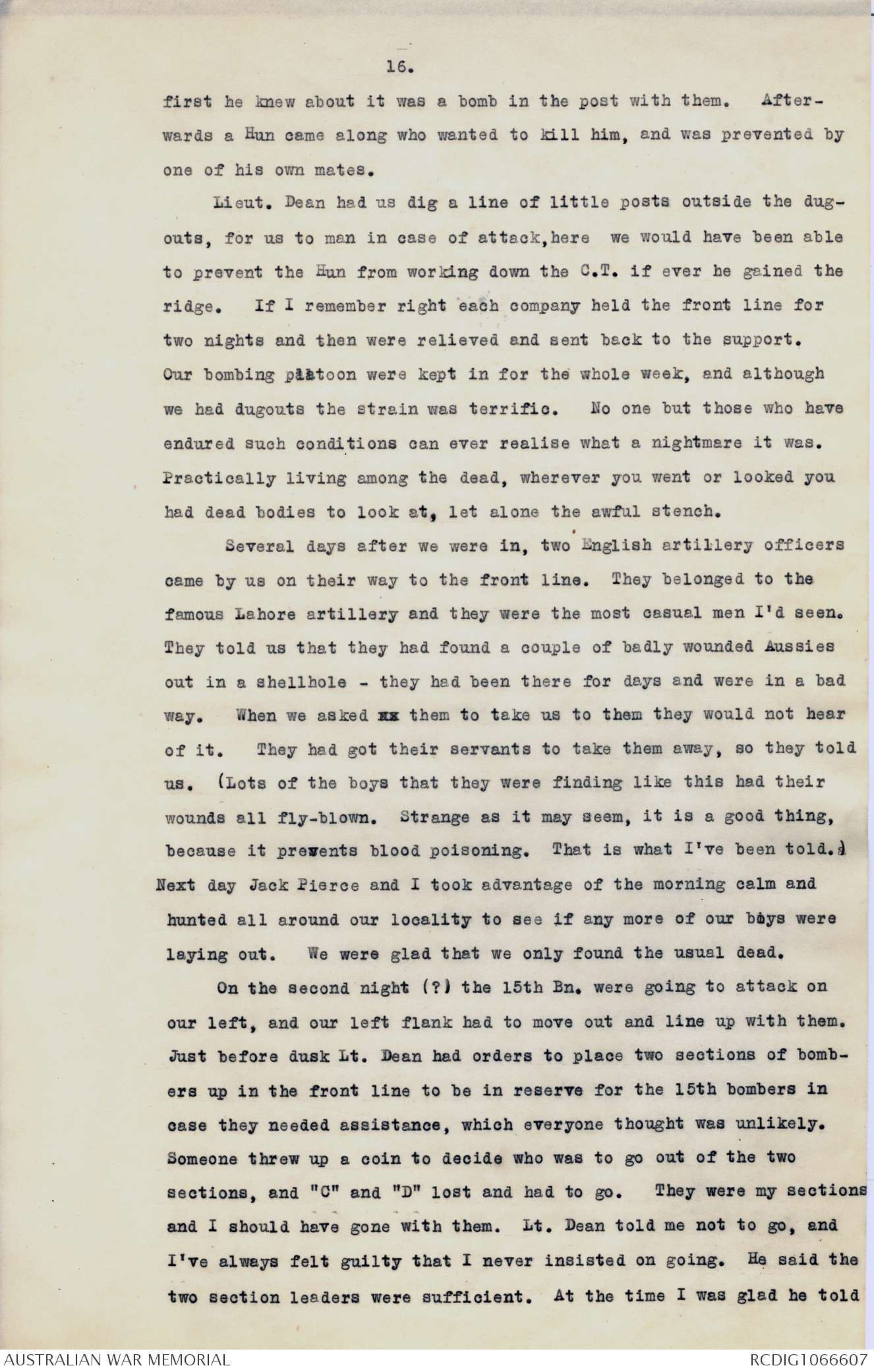
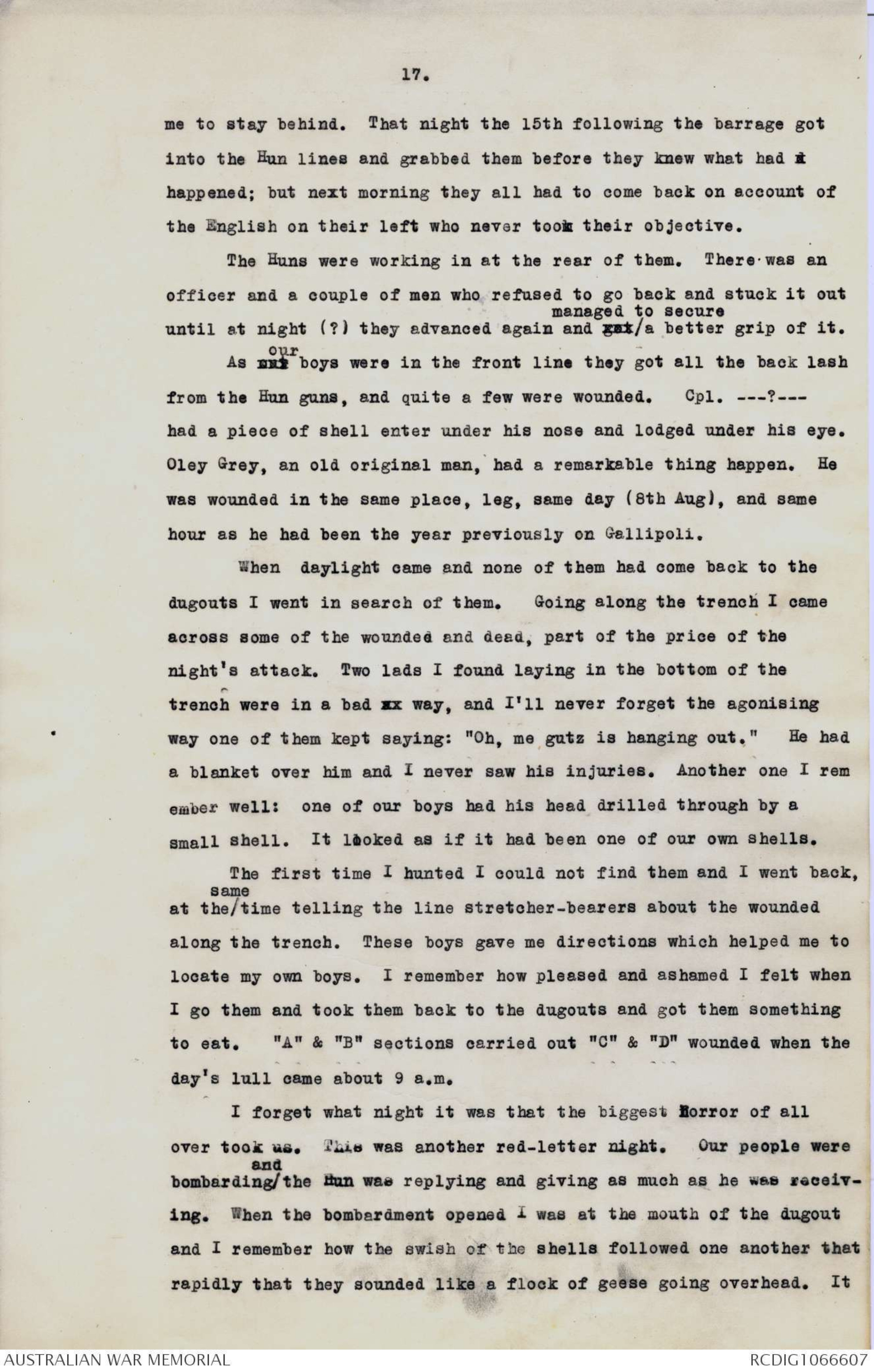
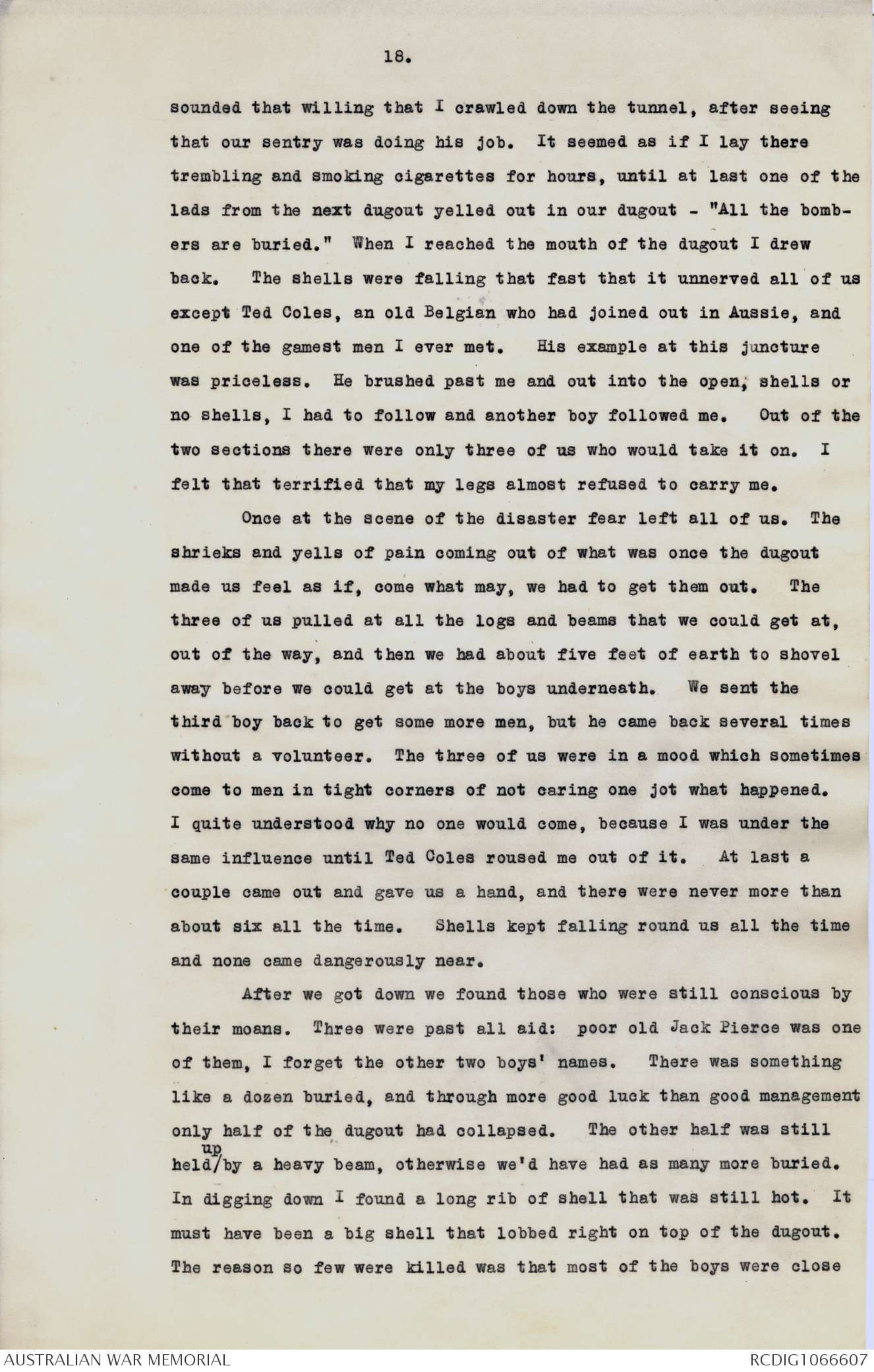
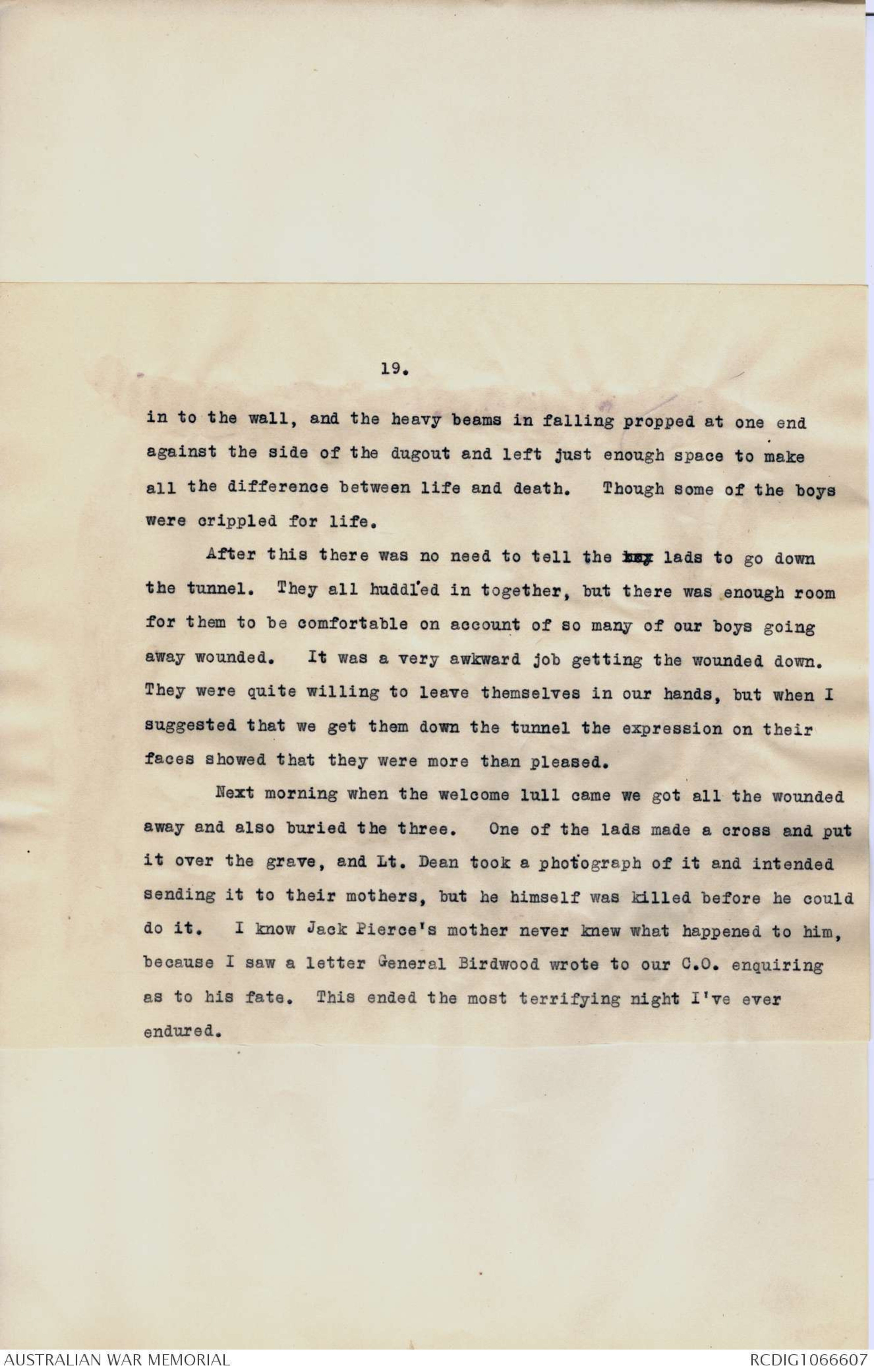
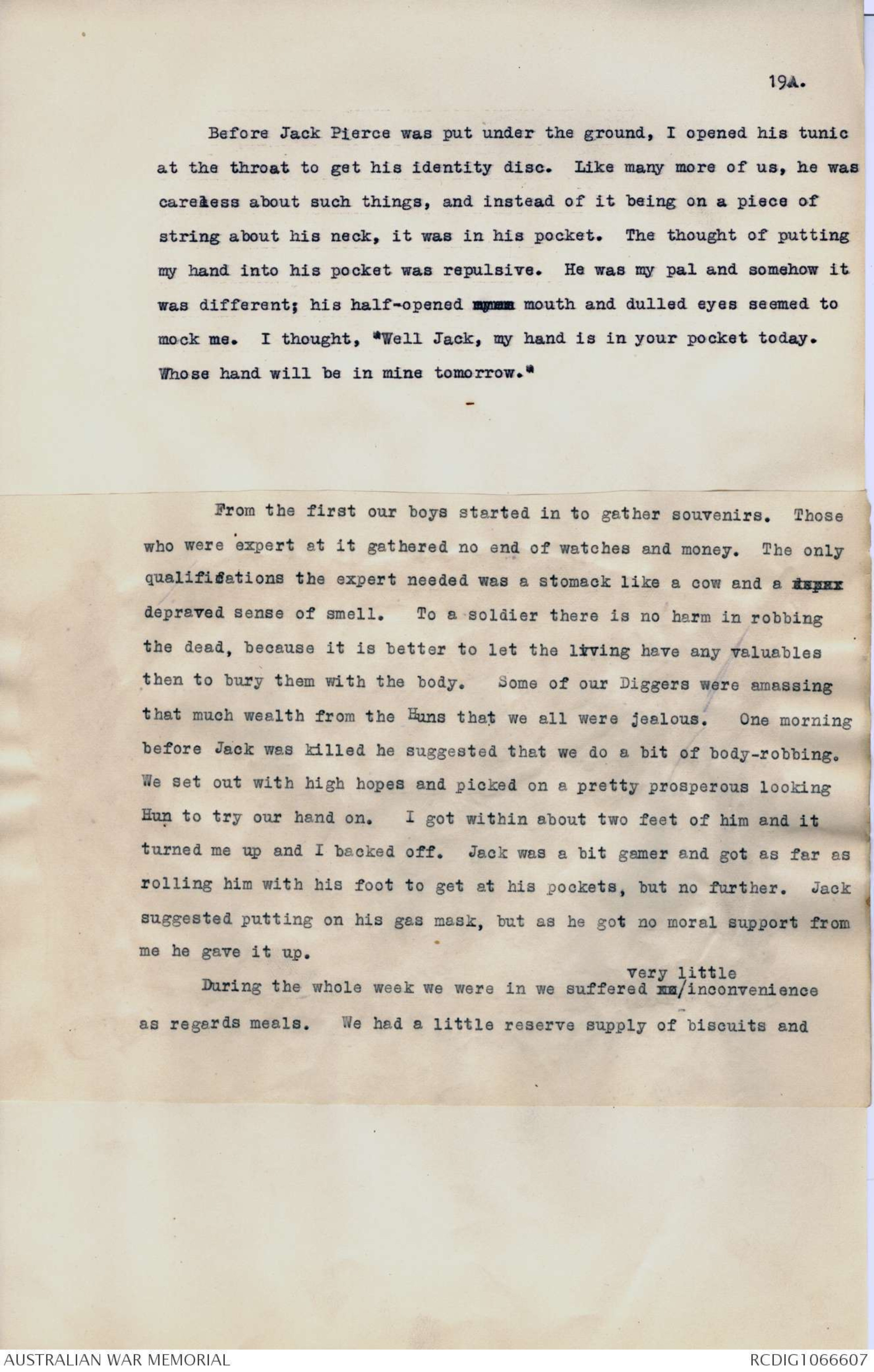
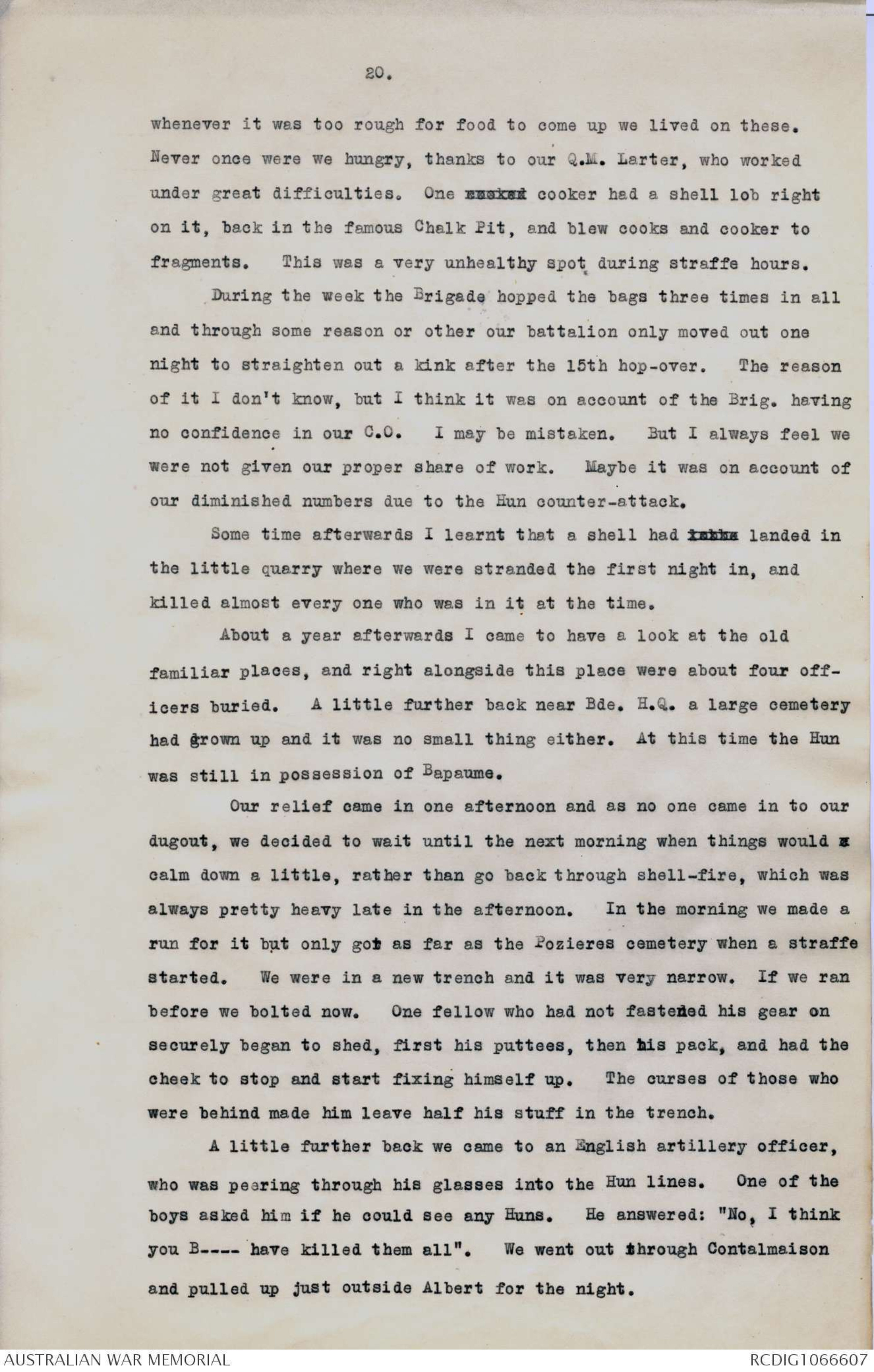
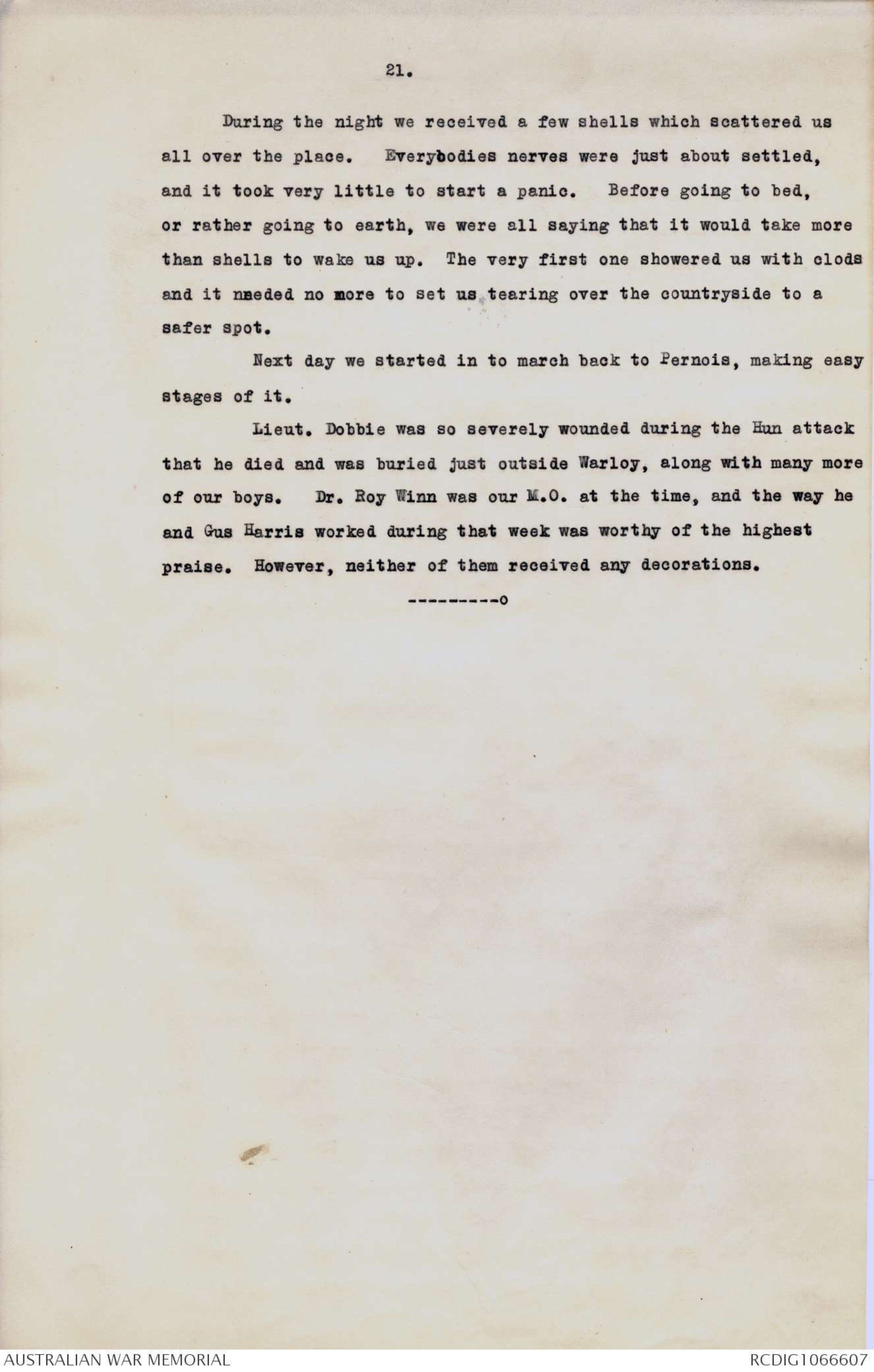
13.
side in the passage, and at the outer end a big Hun was sprawled out
laying face downward on the floor. Another had an Aussie with his
head jammed between two beams which kept him in an upright position.
He evidently had been walking along this passage when a shell crashed
in xx top of the dugout with the above result. Those that we could
get at with dirt we covered over, and those we could not reach we
kept away from.
The dugout that Jack Pierce and his section "A" & "B" were in
was an ordinary surface dugout with about 6 or 7 feet of earth on it.
The roof was supported by strong beams. There was a bit of a deep
dugout which was a very pokey affair and would only hold a few men
comfortably. I tried to get Jack to send as many men down this as he
could, but he and his men were quite sure that their roof would stand
nearly anything. I was not so sure, but I gave way before the majority.
My own dugout was much the same, but it had a staircase which
went down in the ground quite a way and ran along for about 25 ft.
It then turned to the left and went along for another 25 ft and then
up another staircase into the remains of a burnt out outhouse. It
was just a tunnel connecting one place to another. In the narrowness
of it I knew safety lay - itnwas only 3 ft wide and if a shell
did lob right on top of it could only crush in a small section.
I advocated that all hands get down in the tunnel even if we
were cramped, but again most of the boys thought that they were safe
enough in the top dugout. At any time that I was resting I always
made it my business to go down in the tunnel, only a couple of the
boys coming with me.
After we had got settled down a little Jack Pierce and myself
took a walk up to the front line, which was only a few yards away.
The sights we saw were enough to haunt a man for the rest of his days.
It was the greatest number of dead I'd ever seen, and I've only seen
two other places that were like it. Almost without exception every
shell-hole had one or two dead men in it. The shell-holes were very
close together, so that it gives a faint idea what it looked like.
Add to this the awful smell, and the bloated, black appearance of the
dead. On account of the terrific shell-fire scores were under the
ground and hidden from view. This kept going on continually, bodies
14.
being buried and blown out again. There was one man in particular,
a Hun, which was the talk of the line. He must have been an
immense man when he was alive, and now that he was dead and bloated
he seemed to have taken on the shape and size of a horse. He laid
on the parapet in the full view of everyone. The impression I got
in looking over this shambles was that there was about fqx five Huns
to about two of our boys.
By the position of some of our dead it was very easy to see
what had happened during the unsuccessful assault on the ridge. In
some places our lads had got almost into the trench before they were
driven back. The awful bombardment of the previous night had completely
wiped out the trench and our boys were now in shell-holes
and working like mad to get them connected. On account of it all
being loose ground it was a very difficult job to do it without sandbags.
These they were very short of, but later on I went scouting
around and picked up quite a few bundles of them belonging to dead
2nd Div. men who were laying out away from the C.T.
During the day we had a few Huns come out of shell-holes and
give themselves up. They hid when they saw they were getting the
worst of it in the morning and as their courage grew so they showed
themselves. One Hun staggered over to us and got into the C.T. and
laid down. I had a look at him and it looked as if a bayonet had
been pushed right through his back and the point just come through
above his nipple. As he breathed air bubbles played in the wound in
the back, and it was clear that as he breathed air was coming in and
going out through it. As our stretcher-bearers were overworked in
getting our own boys out, the Huns had to take pot luck. I never
worried about this fellow at all, because I made sure he'd die anyway.
Every time we went by him, he made us understand that the he
wanted to be taken out. Several of us got some bags etc. and put
under him and we threw an overcoat over him. Later on he kept saying
"English no camarade", and I wished he'd die and get it over. None
of us went near him during the night, and next morning as several
other new Huns were going out down the C.T. I got the shock of my
life to see this fellow staggering along with them.
15.
Another case was a young Hun, only a boy, with his thigh
smashed. He could talk a little English and he told us that he was
a medical student and had just come in the line. I asked him if
he was glad that he was a prisoner, and he looked up at me with a
very sad expression on his face and shook his head and said "No”.
He was a very brave kid, and it was easily seen that he was not of
the bovine type of Hun.
That night we set a sentry over each dugout and the rest
kept inside. I crawled down the tunnel and had a struggle with a lot
of rubbish, boxes, etc. that some of the boys had thrown down it
rather than take it outside, and after a lot of work I spread it out
along the floor. For a couple of days our dugouts were very free
from shell-fire, most of the shells falling just about fifty yards
over on the right. Later on new guns came into play and kept the
trench in a wrecked condition continually, despite our efforts to
keep the C.T. open. The trench we were in was a C.T. which connected
the front line with the support. Every morning after we had
breakfast all hands got out and repaired it as much as possible
though towards the end of the week it was in a very bad way. Generally,
both sides had a bit of a rest from about 8 to 10 a.m., the
reason being that they had about used up most of their supply of
shells during the night. This was about the only respite we had out
of the 24 hours.
The morning after our first night in the dugouts some of our
wounded, who had survived the Hun attack of the Monday morning were
being brought out, after laying in holes and dugouts in the front
line for about 24 hours. In these men I recognised my old pal, Alf.
Day, who was wounded that bad that he was sent to Australia later on.
He was attempting to crawl and scramble out. His wounds had all
become stiff and when I saw him he was hanging on to a post in the
trench looking very bad. We were all very busy and no one took
much notice of cases like this. I dropped work and took him on my
back, and carried him back to the support line, and then got another
man to carry him a little further and pass him on. It was the last
I saw of my old pal. He told me that when the Huns attacked the
16.
first he knew about it was a bomb in the post with them. Afterwards
a Hun came along who wanted to kill him, and was prevented by
one of his own mates.
Lieut. Dean had us dig a line of little posts outside the dugouts,
for us to man in case of attack, here we would have been able
to prevent the Hun from working down the C.T. if ever he gained the
ridge. If I remember right each company held the front line for
two nights and then were relieved and sent back to the support.
Our bombing platoon were kept in for the whole week, and although
we had dugouts the strain was terrific. No one but those who have
endured such conditions can ever realise what a nightmare it was.
Practically living among the dead, wherever you went or looked you
had dead bodies to look at, let alone the awful stench.
Several days after we were in, two English artillery officers
came by us on their way to the front line. They belonged to the
famous Lahore artillery and they were the most casual men I'd seen.
They told us that they had found a couple of badly wounded Aussies
out in a shellhole - they had been there for days and were in a bad
way. When we asked xx them to take us to them they would not hear
of it. They had got their servants to take them away, so they told
us. (Lots of the boys that they were finding like this had their
wounds all fly-blown. Strange as it may seem, it is a good thing,
because it prevents blood poisoning. That is what I've been told.)a
Next day Jack Pierce and I took advantage of the morning calm and
hunted all around our locality to see if any more of our boys were
laying out. We were glad that we only found the usual dead.
On the second night (?) the 15th Bn. were going to attack on
our left, and our left flank had to move out and line up with them.
Just before dusk Lt. Dean had orders to place two sections of bombers
up in the front line to be in reserve for the 15th bombers in
case they needed assistance, which everyone thought was unlikely.
Someone threw up a coin to decide who was to go out of the two
sections, and "C" and "D" lost and had to go. They were my sections
and I should have gone with them. Lt. Dean told me not to go, and
I've always felt guilty that I never insisted on going. He said the
two section leaders were sufficient. At the time I was glad he told
17.
me to stay behind. That night the 15th following the barrage got
into the Hun lines and grabbed them before they knew what had d
happened; but next morning they all had to come back on account of
the English on their left who never took their objective.
The Huns were working in at the rear of them. There was an
officer and a couple of men who refused to go back and stuck it out
until at night (?) they advanced again and get ^managed to secure a better grip of it.
As boys were in the front line they got all the back lash
from the Hun guns, and quite a few were wounded. Cpl.---?---
had a piece of shell enter under his nose and lodged under his eye.
Oley Grey, an old original man, had a remarkable thing happen. He
was wounded in the same place, leg, same day (8th Aug), and same
hour as he had been the year previously on Gallipoli.
When daylight came and none of them had come back to the
dugouts I went in search of them. Going along the trench I came
across some of the wounded and dead, part of the price of the
night's attack. Two lads I found laying in the bottom of the
trench were in a bad xx way, and I'll never forget the agonising
way one of them kept saying: "Oh, me gutz is hanging out." He had
a blanket over him and I never saw his injuries. Another one I remember
well: one of our boys had his head drilled through by a
small shell. It looked as if it had been one of our own shells.
The first time I hunted I could not find them and I went back,
at the ^same time telling the line stretcher-bearers about the wounded
along the trench. These boys gave me directions which helped me to
locate my own boys. I remember how pleased and ashamed I felt when
I go them and took them back to the dugouts and got them something
to eat. "A" & "B" sections carried out "C” & "D" wounded when the
day's lull came about 9 a.m.
I forget what night it was that the biggest horror of all
over took us. Thie was another red-letter night. Our people were
bombarding ^and the Hun was replying and giving as much as he was receiving. When the bombardment opened I was at the mouth of the dugout
and I remember how the swish of the shells followed one another that
rapidly that they sounded like a flock of geese going overhead. It
18.
sounded that willing that I crawled down the tunnel, after seeing
that our sentry was doing his job. It seemed as if I lay there
trembling and smoking cigarettes for hours, until at last one of the
lads from the next dugout yelled out in our dugout - "All the bombers
are buried." When I reached the mouth of the dugout I drew
back. The shells were falling that fast that it unnerved all of us
except Ted Coles, an old Belgian who had joined out in Aussie, and
one of the gamest men I ever met. His example at this juncture
was priceless. He brushed past me and out into the open; shells or
no shells, I had to follow and another boy followed me. Out of the
two sections there were only three of us who would take it on. I
felt that terrified that my legs almost refused to carry me.
Once at the scene of the disaster fear left all of us. The
shrieks and yells of pain coming out of what was once the dugout
made us feel as if, come what may, we had to get them out. The
three of us pulled at all the logs and beams that we could get at,
out of the way, and then we had about five feet of earth to shovel
away before we could get at the boys underneath. We sent the
third boy back to get some more men, but he came back several times
without a volunteer. The three of us were in a mood which sometimes
come to men in tight corners of not caring one jot what happened.
I quite understood why no one would come, because I was under the
same influence until Ted Coles roused me out of it. At last a
couple came out and gave us a hand, and there were never more than
about six all the time. Shells kept falling round us all the time
and none came dangerously near.
After we got down we found those who were still conscious by
their moans. Three were past all aid: poor old Jack Pierce was one
of them, I forget the other two boys' names. There was something
like a dozen buried, and through more good luck than good management
only half of the dugout had collapsed. The other half was still
held ^up by a heavy beam, otherwise we'd have had as many more buried.
In digging down I found a long rib of shell that was still hot. It
must have been a big shell that lobbed right on top of the dugout.
The reason so few were killed was that most of the boys were close
19.
in to the wall, and the heavy beams in falling propped at one end
against the side of the dugout and left just enough space to make
all the difference between life and death. Though some of the boys
were crippled for life.
After this there was no need to tell the boy lads to go down
the tunnel. They all huddled in together, but there was enough room
for them to be comfortable on account of so many of our boys going
away wounded. It was a very awkward job getting the wounded down.
They were quite willing to leave themselves in our hands, but when I
suggested that we get them down the tunnel the expression on their
faces showed that they were more than pleased.
Next morning when the welcome lull came we got all the wounded
away and also buried the three. One of the lads made a cross and put
it over the grave, and Lt. Dean took a photograph of it and intended
sending it to their mothers, but he himself was killed before he could
do it. I know Jack Pierce's mother never knew what happened to him,
because I saw a letter General Birdwood wrote to our C.O. enquiring
as to his fate. This ended the most terrifying night I've ever
endured.
19A.
Before Jack Pierce was put under the ground, I opened his tunic
at the throat to get his identity disc. Like many more of us, he was
careless about such things, and instead of it being on a piece of
string about his neck, it was in his pocket. The thought of putting
my hand into his pocket was repulsive. He was my pal and somehow it
was different; his half-opened xxxx mouth and dulled eyes seemed to
mock me. I thought, "Well Jack, my hand is in your pocket today.
Whose hand will be in mine tomorrow."
From the first our boys started in to gather souvenirs. Those
who were expert at it gathered no end of watches and money. The only
qualifications the expert needed was a stomack like a cow and a depar
depraved sense of smell. To a soldier there is no harm in robbing
the dead, because it is better to let the living have any valuables
then to bury them with the body. Some of our Diggers were amassing
that much wealth from the Huns that we all were jealous. One morning
before Jack was killed he suggested that we do a bit of body-robbing.
We set out with high hopes and picked on a pretty prosperous looking
Hun to try our hand on. I got within about two feet of him and it
turned me up and I backed off. Jack was a bit gamer and got as far as
rolling him with his foot to get at his pockets, but no further. Jack
suggested putting on his gas mask, but as he got no moral support from
me he gave it up.
During the whole week we were in we suffered xx ^very little inconvenience
as regards meals. We had a little reserve supply of biscuits and
20.
whenever it was too rough for food to come up we lived on these.
Never once were we hungry, thanks to our Q.M. Larter, who worked
under great difficulties. One cooked cooker had a shell lob right
on it, back in the famous Chalk Pit, and blew cooks and cooker to
fragments. This was a very unhealthy spot during straffe hours.
During the week the Brigade hopped the bags three times in all
and through some reason or other our battalion only moved out one
night to straighten out a kink after the 15th hop-over. The reason
of it I don't know, but I think it was on account of the Brig. having
no confidence in our C.O. I may be mistaken. But I always feel we
were not given our proper share of work. Maybe it was on account of
our diminished numbers due to the Hun counter-attack.
Some time afterwards I learnt that a shell had lobbe landed in
the little quarry where we were stranded the first night in, and
killed almost every one who was in it at the time.
About a year afterwards I came to have a look at the old
familiar places, and right alongside this place were about four officers
buried. A little further back near Bde. H.Q. a large cemetery
had grown up and it was no small thing either. At this time the Hun
was still in possession of Bapaume.
Our relief came in one afternoon and as no one came in to our
dugout, we decided to wait until the next morning when things would x
calm down a little, rather than go back through shell-fire, which was
always pretty heavy late in the afternoon. In the morning we made a
run for it but only got as far as the Pozieres cemetery when a straffe
started. We were in a new trench and it was very narrow. If we ran
before we bolted now. One fellow who had not fastened his gear on
securely began to shed, first his puttees, then his pack, and had the
cheek to stop and start fixing himself up. The curses of those who
were behind made him leave half his stuff in the trench.
A little further back we came to an English artillery officer
who was peering through his glasses into the Hun lines. One of the
boys asked him if he could see any Huns. He answered: "No, I think
you B----- have killed them all". We went out through Contalmaison
and pulled up just outside Albert for the night.
21.
During the night we received a few shells which scattered us
all over the place. Everybodies nerves were just about settled,
and it took very little to start a panic. Before going to bed,
or rather going to earth, we were all saying that it would take more
than shells to wake us up. The very first one showered us with clods
and it needed no more to set us, tearing over the countryside to a
safer spot.
Next day we started in to march back to Pernois, making easy
stages of it.
Lieut. Dobbie was so severely wounded during the Hun attack
that he died and was buried just outside Warloy, along with many more
of our boys. Dr. Roy Winn was our M.O. at the time, and the way he
and Gus Harris worked during that week was worthy of the highest
praise. However, neither of them received any decorations.
 Sandy Mudie
Sandy MudieThis transcription item is now locked to you for editing. To release the lock either Save your changes or Cancel.
This lock will be automatically released after 60 minutes of inactivity.